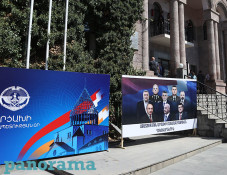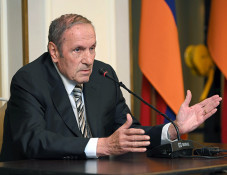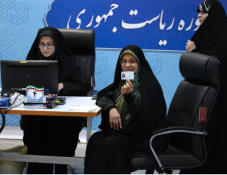
Eynulla Fatullayev: It's Azerbaijani fighters, who are responsible for death of people in Khojaly in 1992, not Armenians
“Fatullayev defends his 2005 comments - which held Azerbaijani fighters, not Armenians, responsible for the 1992 killings - as consistent with those put forward by the Azerbaijani government itself, but says the regime has long sought to use the Khojaly events to persecute its opponents,” says Radio Free Europe/Radio Liberty reporter Daisy Sindelar in her article about former Azerbaijani political prisoner and opposition journalist Eynulla Fatullayev.
Ask Azerbaijani journalist Fatullayev about his 4 years in prison, notes the author, and he'll answer not so much with words as with authors – Dovlatov, Yesenin, Hemingway, Solzhenitsyn, whose works helped him no to break while in prison. Once the co-editor of two influential opposition newspapers - the Russian-language “Realny Azerbaijan” and the Azeri-language “Gundelik Azerbaycan” - Eynulla Fatullayev was jailed in 2007 after being convicted on charges relating to comments on the Khojaly events during the Nagorno-Karabakh war.
“Look at Ayaz Mutalibov, the first president of Azerbaijan. He's still under criminal investigation, and for what? Complicity in the Khojaly events. Officially he is charged with failing to protect his citizens and exposing them to danger. Fahmin Hajiyev, the head of Azerbaijan's interior troops of the country, spent 11 years in prison because of the Khojaly events,” says Fatullayev.
Every year, Azerbaijani television shows a demonstration of little groups of people, holding portraits of Azerbaijanis who, as considered by the government of Azerbaijan, have participated in the Khojaly massacre, says the opposition journalist, adding that the government itself used those events to undermine the reputation of the Azerbaijani opposition who had been in power at the time. “And then to turn it around and put all the responsibility on me - to arrest a journalist - it's nonsense, it's a disgrace perpetrated by the Azeri government,” Eynulla Fatullayev says.
Fatullayev sustained a brutal beating on the street, seen his father kidnapped and his colleague Elmar Huseynov murdered, it is said in the publication of Radio Liberty. When he was imprisoned, officials continued the pressure, adding an additional 2 years to his sentence after allegedly finding heroin in his cell and subjecting Fatullayev to increasingly dismal conditions, including a 15-day wintertime internment in a "kartser," a Soviet-era concrete confinement cell.
“The only way to survive was to remain constantly in motion. If I stood still for even a moment, I would have died. I didn't sleep for 15 days, and I was constantly moving around. The windows were open to the outdoors and there was no bed. There was one very, very small heater, but then they turned that off as well. There were moments when I didn't know what to do, how to go on living,” said Eynulla Fatullayev.
However, as Daisy Sinderal writes, throughout his ordeal, Fatullayev managed to smuggle out articles and letters detailing his experience in jail, even as his lawyers were themselves pressured and frequently forced out of work. He also briefly found solace in a prison-time friendship with a fellow journalist and blogger Emin Milli, who was serving a 17-month term for hooliganism. Released in late 2010, Emin Milli soon left for England since he faced an uncertain future in Azerbaijan.
Eynulla Fatullayes says he's devastated by what's happened to his friend, however, he himself together with his wife Nigar is determined to stay in Azerbaijan, despite the fact that her family, many of whom work for the state administration, warned Nigar to steer clear of life with an opposition journalist. Nigar Fatullayeva says, she's ready to be with her husband until the end, even if he'll be in prison again.
Eynulla Fatullayev is perhaps the Azerbaijani journalist who is best known to the international community, it's said in the article. Reporters Without Borders and the Committee to Protect Journalists both repeatedly challenged his sentence, and Amnesty International named him a prisoner of conscience. The European Court of Human Rights ruled on Fatullayev's behalf a full year before he was finally released by a presidential pardon. In journalist's opinion, the attention may not have immediately secured his freedom, but it may have saved his life in prison. “They couldn't have killed me with everyone watching,” Fatullayev says.
For now, Fatullayev is content to continue blogging, but he is eager to return to newspaper publishing. “My friends want me to leave Azerbaijan, to go teach journalism someplace safe. But I don't want to give my captors the satisfaction. I want them to know: I'm still here - alive, working, and telling the truth,” says the journalist, however, acknowledging that prospects for Azerbaijan look bleak.
Azerbaijan, says Fatullayev, is witnessing a transformation from authoritarianism to totalitarianism, the first signs of which are the limits on the right to expression and freedom of speech. “Our imitation democracy is over, any early signs of liberalism were nipped in the bud. So it's very difficult to live in this country, let alone to resume journalistic work,” says Eynulla Fatullayev at the end.
Newsfeed
Videos






























